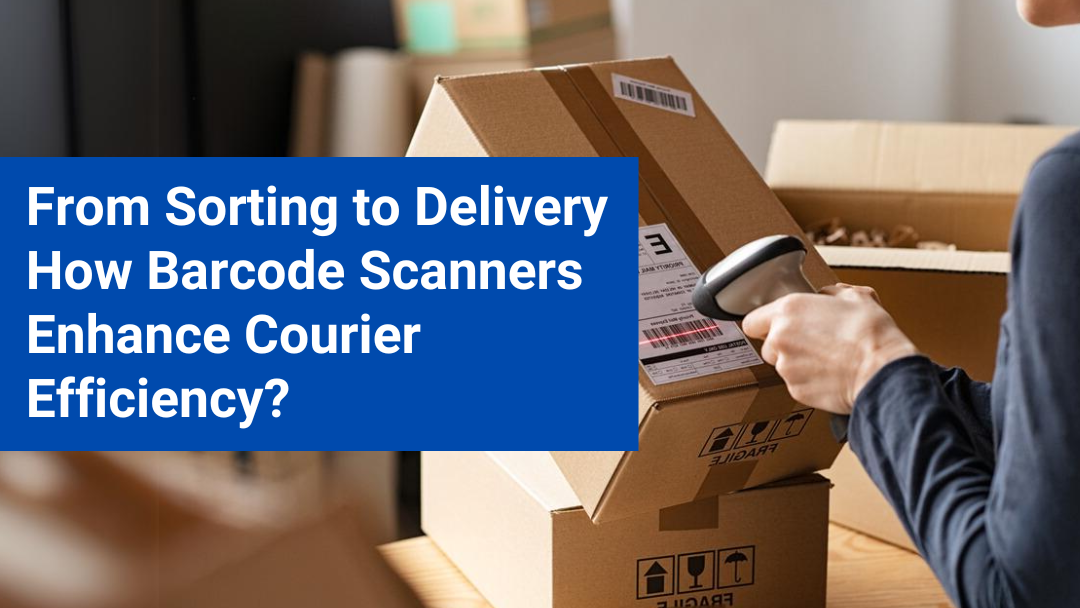From Sorting to Delivery- How Barcode Scanners Enhance Courier Efficiency?
In today’s fast-paced logistics industry, efficiency is everything. From the moment a package enters a distribution centre to the final delivery at a customer’s doorstep, speed and accuracy are crucial to ensuring a seamless process. Barcode scanners have become the unsung heroes of this journey, transforming courier operations by reducing errors, enhancing tracking, and streamlining workflow at every stage.
In this blog, we’ll explore how barcode scanners play a pivotal role in boosting courier efficiency—from sorting to delivery—ensuring packages arrive quickly and accurately while keeping customers satisfied.
Challenges faced in the absence of barcode scanners:
The absence of barcode scanners in courier operations imposes a significant negative impact on efficiency, affecting every stage from sorting to delivery. Here’s how it could hinder courier services:
1) Manual Sorting and Increased Errors:
- Slower Sorting Process: Without barcode scanners, sorting parcels would rely on manual processes, such as reading labels and manually entering information. This would slow down sorting significantly, especially in large distribution centers handling thousands of parcels daily.
- Higher Risk of Errors: Manual data entry is prone to human errors, such as mistyping addresses or shipping codes. These mistakes could result in misrouted parcels, leading to delays or packages being sent to the wrong locations.
2) Lack of Real-Time Tracking:
- No Instant Package Updates: Without barcode scanners, it becomes difficult to provide real-time tracking updates. Couriers would need to manually update systems at various stages, making it impossible to offer customers real-time visibility into their parcel’s location.
- Poor Customer Experience: Customers expect to be able to track their parcels at any point during transit. Without barcode scanning technology, updates would be less frequent and less accurate, leading to customer frustration and reduced trust in the service.
3) Inventory Management Challenges:
- Difficulty in Keeping Accurate Inventory: In warehouses and sorting facilities, keeping track of thousands of packages manually is a logistical challenge. The absence of barcode scanners would make it harder to know the exact location of each parcel, increasing the chances of lost or misplaced items.
- Increased Chances of Stock Discrepancies: Without scanning, maintaining accurate records of incoming and outgoing packages would be challenging, leading to inventory discrepancies and confusion in handling parcels.
4) Inefficient Route and Delivery Management:
- Longer Loading Times: Barcode scanners help optimize the loading process by ensuring parcels are loaded according to their delivery route. Without them, drivers would have to rely on manually checking labels, slowing down the loading process and increasing the risk of misplacing parcels.
- Poor Route Optimization: Barcode scanners aid in organizing deliveries in the most efficient order. Without this technology, couriers would have to rely on manual planning, potentially leading to less efficient routes, increased fuel consumption, and longer delivery times.
5) Lack of Proof of Delivery:
- No Digital Proof: Barcode scanners allow couriers to scan a parcel upon delivery, providing a digital record with a timestamp and location. Without scanners, couriers would need to manually record deliveries, increasing the likelihood of disputes over delivery times or locations.
- Delayed Signature Collection: Modern barcode scanners also capture signatures digitally. Without this feature, couriers would need to manually collect signatures on paper, slowing down the process and making it harder to store and manage proof of delivery.
6) Increased Operational Costs:
- Higher Labour Costs: Without barcode scanners, more manual labor would be required to process, track, and manage parcels. This would increase the workforce required for these tasks, driving up operational costs.
- More Frequent Delivery Errors: Errors such as delivering to the wrong address or losing parcels could increase without barcode scanners, leading to more customer complaints, refunds, and redelivery costs.
7) Data and Performance Monitoring Issues:
- No Automated Data Collection: Barcode scanners automatically collect data on every scanned parcel, which can be used for performance analysis and optimization. Without this technology, it becomes challenging to gather reliable data on package movement, delivery times, and overall courier performance.
- Lack of Operational Insights: The absence of barcode scanners would limit the ability of courier companies to analyze trends, identify bottlenecks, or improve efficiencies, leading to suboptimal decision-making.
Why are barcode scanners important in courier companies?
Barcode scanners play a vital role in enhancing courier efficiency from sorting to delivery. Here’s how they contribute at various stages of the courier process:
1) Sorting:
- Fast and Accurate Sorting: Barcode scanners enable quick and precise sorting of packages in warehouses and distribution centres. Couriers handle thousands of parcels daily, and scanning barcodes ensures that each parcel is directed to the correct destination without manual data entry.
- Minimized Human Error: Manual sorting increases the risk of mistakes, such as sending a package to the wrong location. Barcode scanners eliminate this by automating package identification and routing.
2) Tracking and Inventory Management:
- Real-Time Tracking: Barcodes allow for real-time tracking of parcels throughout the courier process. Each time a package is scanned, its status is updated in the courier’s system, providing accurate information for both the business and the customer.
- Inventory Control: At warehouses, barcode scanners help track inventory, ensuring that parcels are accounted for at all times, reducing the chances of loss or misplacement.
3) In-Transit Monitoring:
- Efficient Route Management: Barcode scanners assist drivers by scanning parcels before loading. The system can organize parcels in the most efficient delivery order, reducing time and fuel consumption.
- Dynamic Updates: When parcels are scanned at different checkpoints during transit, the system dynamically updates delivery times, allowing for better route optimization and resource management.
4) Delivery:
- Proof of Delivery: Upon delivery, barcode scanners ensure packages are delivered to the correct recipient. Couriers scan the barcode to confirm delivery, providing a timestamp and proof of delivery for customers.
- Signature Capture: Modern barcode scanners often come with signature capture features, enabling customers to sign for parcels digitally, further automating and securing the process.
5) Customer Satisfaction:
- Transparency and Communication: With barcode scanning, customers can track their packages at every stage. The increased visibility and real-time updates improve communication between the courier service and customers, leading to higher satisfaction.
- Reduction of Lost Packages: Since barcode scanners reduce the chance of human error and misplaced items, the rate of lost or delayed packages is minimized, further boosting customer trust.
6) Data Analytics:
- Performance Monitoring: Barcode scanners collect valuable data at each step of the delivery process. Courier companies can analyze this data to identify bottlenecks, optimize delivery times, and improve overall operational efficiency.
- Trend Analysis: Data from barcode scanners help in identifying peak periods, delivery performance, and areas that require more resources, allowing for strategic planning and better resource allocation.
- ows from manufacturers to consumers. It allows companies to monitor performance metrics, such as delivery times, stock levels, and sales velocity.
Hence, a POS solution in the supply chain segment enhances operational efficiency, optimizes inventory, and improves communication across different supply chain partners. This leads to smoother operations and better customer service.
SUMMING UP
Barcode scanners revolutionize the courier industry by streamlining sorting, providing real-time tracking, and minimizing errors in delivery. This enhances efficiency, reduces costs, and improves customer satisfaction, making them an essential tool in modern logistics and courier services.
Without barcode scanners, courier operations would slow down considerably, with a higher likelihood of errors, delays, and increased costs. The lack of automation and real-time tracking would negatively affect both operational efficiency and customer satisfaction, making it difficult for courier services to remain competitive in today’s fast-paced logistics environment.

